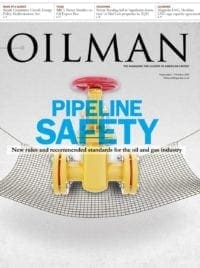Texas Railroad Commission Chairman David Porter on July 8 testified before the U.S. House of Representatives Agriculture Committee on the importance of ending the federal ban on oil exports.
Porter said in his testimony that the ban is responsible for the disparity between the U.S. pricing benchmark for crude – WTI – and the international benchmark – Brent.
“The majority of the new oil being produced from our shale formations is light sweet crude, and the U.S. refining capacity is not designed to economically handle the increased volumes of this type of crude,” he said. “As a result, our oil is essentially trapped in the U.S., creating a supply glut that is driving down the price of U.S. oil.”
He said that the glut represents billions of dollars of lost revenue that could be returned to the U.S. economy.
Noting that the Texas State Legislature passed, and Governor Abbott signed, a resolution asking the U.S. Congress to lift the ban on crude exports, Porter said that lifting the ban would:
- increase production in the U.S., resulting in new U.S. job creation, economic growth and increased state and federal revenue
- help consumers save money on gasoline
- enhance free trade and lower the U.S. trade deficit
- strengthen U.S. national security and help U.S. global allies
In his testimony, Porter cited a report issued in May by the Center for New American Security about the multiple ways lifting the ban would enhance U.S. national security, including for instance, the ability of the U.S. to sustain and expand energy sanctions.
The report said that the U.S. will be in a stronger position to impose future energy sanctions, if necessary, if it promotes free trade in energy.
“In so doing, policymakers would make it possible for U.S. producers to expand production more easily to substitute for global supplies unavailable due to sanctions,” the report said.
Porter concluded that allowing the free trade of oil would make the U.S. a global energy leader.
“It would mean hundreds of thousands of new jobs for Americans, thriving communities with vibrant economies, and families saving money every time they fill up their cars,” he said. “This is the world I want to live in, and the world we can live in if Congress and the President take immediate action to lift the crude oil export ban.”




